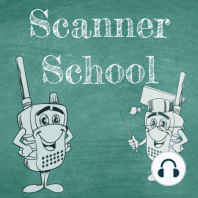12 min listen

238 - Marine Monitoring
FromScanner School - Everything you wanted to know about the Scanner Radio Hobby
238 - Marine Monitoring
FromScanner School - Everything you wanted to know about the Scanner Radio Hobby
ratings:
Length:
41 minutes
Released:
Jul 12, 2022
Format:
Podcast episode
Description
Being here on Long Island, we are obviously surrounded by water on all sides. One of my favorite things to scan during the summertime are the VHF Marine Channels, as well as the USCG “CG”, “LANT” or “NET” frequencies (whatever they are called these days). I’d like to thank Greg Weamer for suggesting this week’s podcast topic. If you have a topic you’d like me to cover, please let me know. What You Need To Know VHF Marine Frequencies are globally carved out of the VHF Spectrum USCG is the international distress frequency, and all mariners should monitor that channel. Even if you don’t want to scan the full channel list, Ch 16 should be a bare minimum. VHF Marine frequencies range from 156 to 174 MHz Most scanner radios have a built-in search band for VHF marine with channels already defined. Frequencies can be found using a simple web search, using the Radio Reference Database, or even on Wikipedia. You can expect to find a wide range of transmissions and traffic on these frequencies depending on who is using each channel. You may hear fishing reports, asking for a bridge to open, or boats announcing their navigational intentions. The layout of the VHF marine channels are broken down by certain uses for frequencies. You have sections that are set aside for port operations, for commercial use, for non-commercial use, for inter ship safety, calling coast guard, digital selective calling or DSC, and automatic identification system. VHF Marine channels are Simplex, meaning they are point to point (boat to boat). Typically, there are no repeaters involved on these frequencies. Because of this, the USCG uses high power stations on tall towers usually on waterway coast. There are plenty of times to when the coast guard needs help hearing somebody, and vice versa. There are a few occasions where you will find a USCG repeater. These repeaters will crossband the VHF channel to a USCG Frequency. You may even be lucky enough to have a VHF channel patched into your local trunk system. This could be used by other users on the trunk system to monitor USCG activity during exercises or rescue attempts. How do large vessels, tankers, ferries, and cruise ships navigate tight waterways and ports? Harbor Masters are like the air traffic controllers of the waterways. They will give you clearance to enter in or they will tell you who to follow in. We can also track marine traffic similar to how we track planes with ADS-B. Marine uses AIS and we can find out all of these vessels that are reporting on sites like shipfinder.com and shipfinder.co. DSC or digital selective calling is kind of panic button on your radio. It sends out a digital SOS, and that alerts the coast guard with your vessel ID and a GPS coordinate. In the US Coast Guard uses several prefixes at the beginning of their messages. PAN PAN is an emergency that indicates somebody is declaring an urgent situation, but maybe not an immediate threat to life or the vessel or people on board. A Sécurité call is an informational broadcast Mayday is used when there is immediate threat to life There are also general “Attention all Mariners” messages for informational broadcasts The coast guard has its own frequencies they use for their only use. A lot of these are P25 and many are encrypted. There are also UHF channels, and they are basically from 406 to 420 right in the middle of the federal band. The US Coast Guard Auxiliary is a civilian branch of the Coast Guard. ==================================== ? Join our new Scanner Radio Community ==================================== Join our FREE Discord server and connect with other Scanner Radio Users! By using Discord, a free, multi-platform community portal, you can now be part of the Scanner Radio Discussion! Chat real time, share photos, ask questions, and give feedback to other's in chat. ? https://www.scannerschool.com/discord ==================================== ? Check out our online courses ==================================== Our fre
Released:
Jul 12, 2022
Format:
Podcast episode
Titles in the series (100)
002 - Frequencies and Hertz: What is a frequency and how do we measure it? by Scanner School - Everything you wanted to know about the Scanner Radio Hobby